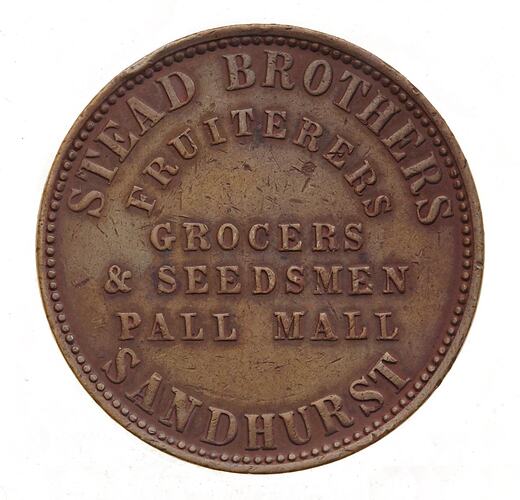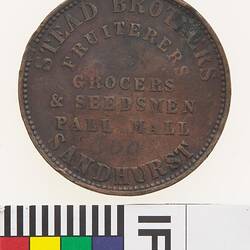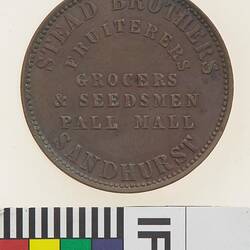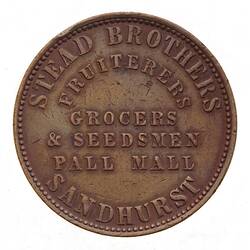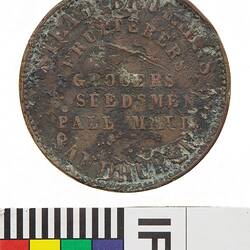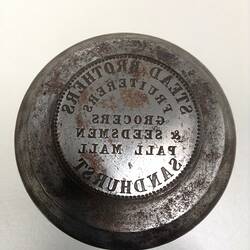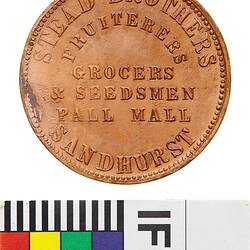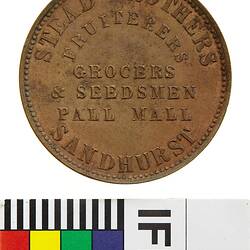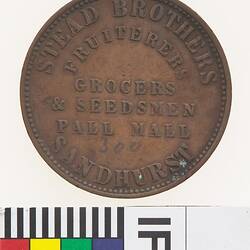The three Stead brothers came to Victoria in the early 1850s from Leeds in England, according to Gardner. The Public Records Office of Victoria (PROV) records of immigration to Victoria do not indicate that three men of that name arrived on the same ship before 1858. They established themselves as 'fruiterers, grocers and produce merchants' in Bendigo soon afterwards. Their shop was in the Pall Mall, in a building next door to the Lyceum Theatre.
Evidence from newspapers and directories shows that the brothers were active in their business through the 1860s. Between 1862 and 1864 (possibly starting earlier) they maintained a store at 47 Swanston Street, Melbourne, as well as their main shop in Pall Mall, Sandhurst (Bendigo). From 1865 they were using H. Box & Co.'s premises as their Melbourne address.
John Stead ran the Bendigo side of the business, his brothers looking after the Melbourne depot. The brothers ran a number of teams between the two cities, receiving, according to Gardner, up to £120 per ton carted.
One of Gardner's correspondents reported that 'Stead's shop did a very lucrative business in the 50's despite the very heavy cost of transit of goods by teams. The shop consisted at that time of a large open front (no window), which was dressed with a fine show of fruit and confectionery, and inside stocked with all the goods required for a grocery store.'
John Hope's research has revealed that the Steads kept something of a menagerie, which was not always kept under control:
'[The shop] was well stocked and included an interesting menagerie.
It is recorded that their magpie escaped and a five [pound] reward was offered. Then, their monkey escaped and the local paper reported:
''The Travelled Monkey''
That embodiment of mischief, 'Stead's Monkey', managed yesterday to slip his chain and occassioned considerable amusement to a large crowd by his agility and cunning in avoiding his intending captors.
Having gained his vantage ground on the roof of the deserted Market Shed, he grinned defiance for some time till, driven out of there he retired to Smith's carriage factory where he was eventually captured in a buggy.'
Gardner also states that John ran the business for a relatively short time before handing it over to his brother-in-law's management. In the 1870s he visited his home town, returning to Bendigo after some time, dying there in 1889. Of his brothers, one is said to have died in Australia while the other returned to England.
The Steads issued two tokens in 1862. Both tokens had the same obverse, describing the location and nature of their business. The reverses used two of Thomas Stokes' stock patterns, the Australian Arms, and 'In Vino Veritas'.
References:
Gardner, F. (1912). 'Trade Tokens and the Firms who Issued Them', The Australian Storekeepers and Traders Journal, 30 March, p.10.
PROV internet index of Unassisted Immigrants to Victoria, 1852-1923.
Sharples, J. (1993). 'Catalogue of Victorian Trade Tokens' in Journal of the Numismatic Association of Australia, Vol. 7, December, p.19.
Advertisement, The Bendigo Advertiser, 4 July 1862, p.1.
Advertisement, Sands and McDougall Melbourne Directory for 1863, advertisements p.33.
Advertisement, Sands and McDougall Melbourne Directory for 1864, advertisements p.44.
Advertisement, Sands and McDougall Melbourne Directory for 1865, advertisements p.54.
Hope, John (2005). 'Stead Brothers', unpublished MSS, 2pps.
More Information
-
Keywords
-
Localities
-
Authors
-
Article types
